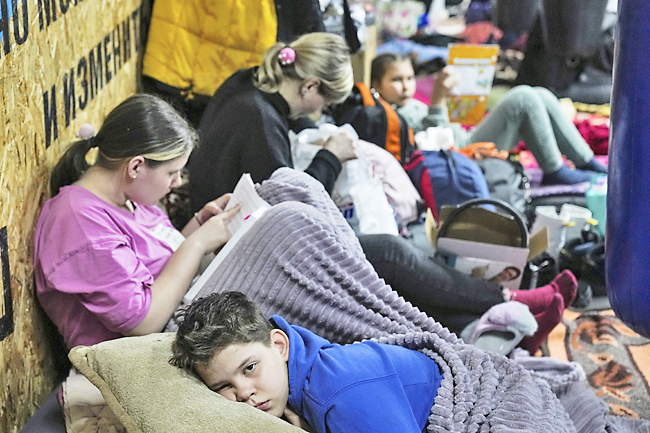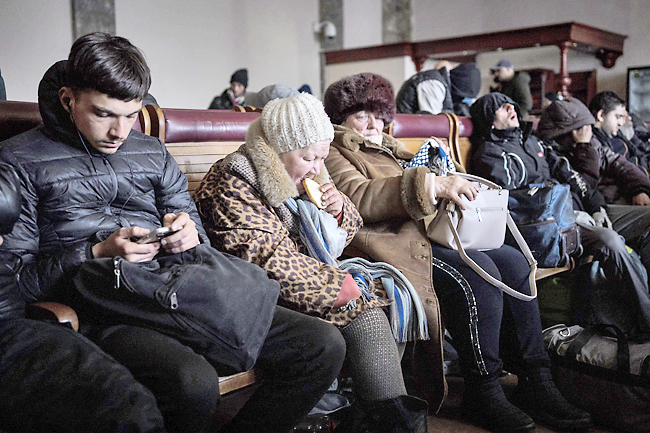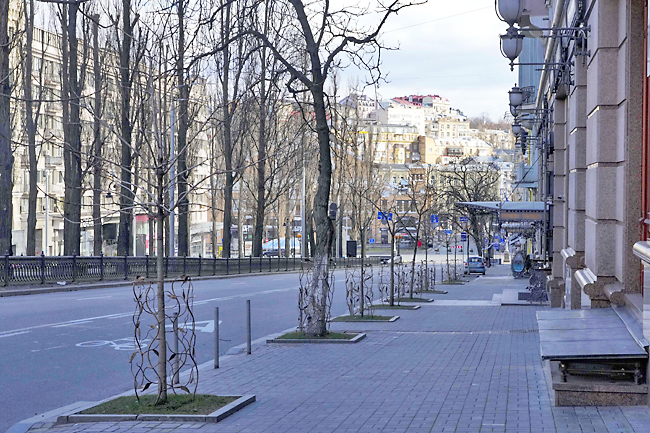Yuras Karmanau, Jim Heintz,Vladimir Isachenkov & Dasha Litvinova
KYIV (AP) – Russian President Vladimir Putin dramatically escalated East-West tensions by ordering its nuclear forces put on high alert following new crippling Western sanctions that forced his Central Bank to sharply raise its key rate yesterday to save the ruble from collapse.
The explosions and gunfire around the Ukrainian capital besieged by the Russian forces appeared to subside overnight, and the Russian military offered to allow residents to leave Kyiv via a safe corridor while it has beefed up for an onslaught on the capital.
Ukraine has agreed to talks with Moscow, and its delegation was heading to the border with Belarus in the north for the meeting.
Citing “aggressive statements” by NATO and tough financial sanctions, Putin on Sunday issued a directive to increase the readiness of Russia’s nuclear weapons, raising fears that the invasion of Ukraine could lead to nuclear war, whether by design or mistake.
The Russian leader is “potentially putting in play forces that, if there’s a miscalculation, could make things much, much more dangerous”, said a senior United States (US) defence official, speaking on condition of anonymity to discuss rapidly unfolding military operations.
Putin’s directive came as Russian forces encountered strong opposition from Ukraine defenders. Moscow has so far failed to win full control of Ukraine’s airspace, despite advances across the country. US officials said they believe the invasion has been more difficult, and slower, than the Kremlin envisioned, though that could change as Moscow adapts.



The conflict – seemingly more quiet overnight on Sunday than in past nights – could evolve significantly if Russia gets military help from neighbouring Belarus, which is expected to send troops into Ukraine, according to a senior American intelligence official with direct knowledge of current US intelligence assessments who spoke anonymously because he was not authorised to speak publicly. The official said that whether Belarus enters the war depends on Ukraine-Russia talks set to happen in coming days.
Amid the mounting pressure, Western nations said they would tighten sanctions and buy and deliver weapons for Ukraine, including Stinger missiles for shooting down helicopters and other aircraft. European countries will also supply fighter jets to Ukraine, European Union (EU) Foreign Policy Chief Josep Borrell said.
Ukrainian President Volodymyr Zelenskyy’s office, has confirmed a meeting with a Russian delegation at an unspecified location on the Belarusian border.
It wasn’t immediately clear when the meeting would take place, nor what the Kremlin was ultimately seeking, either in those potential talks on the border or, more broadly, from its war in Ukraine. Western officials believe Putin wants to overthrow Ukraine’s government and replace it with a regime of his own, reviving Moscow’s Cold War-era influence.
The fast-moving developments came as scattered fighting has continued around Kyiv. Battles also broke out in Ukraine’s second-largest city, Kharkiv, and strategic ports in the country’s south came under assault from Russian forces.
By late Sunday, Russian forces had taken Berdyansk, a Ukrainian city of 100,000 on the Azov Sea coast, according to Oleksiy Arestovich, an adviser to Zelenskyy’s office. Russian troops also made advances toward Kherson, another city in the south of Ukraine, while Mariupol, a port city on the Sea of Azov that is considered a prime Russian target, is “hanging on”, Arestovich said.
Russian Defence Minister Major General Igor Konashenkov also said troops took control of the area around the Zaporizhzhia nuclear plant in the south. He emphasised that the plant was safe and the radiation levels in the area have remained normal.
With Russian troops closing in around Kyiv, a city of almost three million, the mayor of the capital expressed doubt that civilians could be evacuated. Authorities have been handing out weapons to anyone willing to defend the city. Ukraine is also releasing prisoners with military experience who want to fight, and training people to make firebombs.
But Konashenkov said the military would let Kyiv residents use a highway that leads out of the city to the southwest – an offer that appeared to signal a new onslaught is coming.
A nearly 40-hour curfew in Kyiv ended yesterday morning. The curfew will resume each night, from 10pm until 7am.
In Mariupol, where Ukrainians were trying to fend off attack, a medical team at a city hospital desperately tried to revive a six-year-old girl in unicorn pyjamas who was mortally wounded in Russian shelling.
During the rescue attempt, a doctor in blue medical scrubs, pumping oxygen into the girl, looked directly into the Associated Press video camera capturing the scene.
“Show this to Putin,” he said angrily. “The eyes of this child, and crying doctors.”
Their resuscitation efforts failed, and the girl lay dead on a gurney, her jacket spattered with blood.
Nearly 900 kilometres away, Faina Bystritska was under threat in the city of Chernihiv.
“I wish I had never lived to see this,” said Bystritska, an 87-year-old survivor of World War II. She said sirens blare almost constantly in the city, about 150 kilometres from Kyiv.
Chernihiv residents have been told not to switch on any lights “so we don’t draw their attention”, said Bystritska, who has been living in a hallway, away from any windows, so she could better protect herself.
“The window glass constantly shakes, and there is this constant thundering noise,” she said.
Meanwhile, the Western allies announced a freeze on Russia’s hard currency reserves – an unprecedented move that could have devastating consequences for the country’s financial system. The ruble dived sharply on the news, and Russia’s Central Bank has raised its key rate from 9.5 per cent to 20 per cent in a desperate attempt to shore up the plummeting national currency and prevent a run on banks.
The US, EU and Britain also agreed to block selected Russian banks from the SWIFT system, which facilitates moving money around thousands of banks and other financial institu-tions worldwide.
The EU on Sunday also closed its airspace to Russian airlines and buy weapons for Ukraine. The 27-nation bloc will also ban some pro-Kremlin media outlets, said European Commission President Ursula von der Leyen.
The US also stepped up the flow of weapons to Ukraine, announcing it will send Stinger missiles as part of a package approved by the White House on Friday. Germany likewise plans to send 500 Stingers and other military supplies.
Also, the 193-member United Nations (UN) General Assembly scheduled an emergency session on Russia’s invasion.
Putin, in ordering the nuclear alert, cited not only statements by NATO members but the hard-hitting financial sanctions imposed by the West against Russia, including Putin himself.





